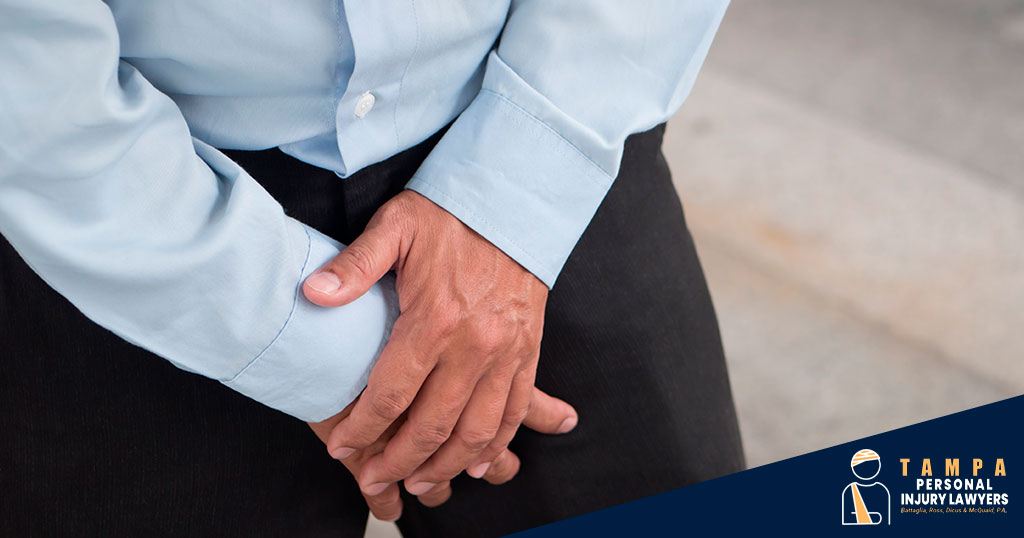This article is intended to help educate women on incontinence after a car accident so they can hire an experienced Tampa car accident lawyer to pursue a case if they experienced such complications after a Tampa car accident.
Incontinence, or bladder control issues, can result from car accident injuries, but many women are unaware of this fact. Many women who suffer incontinence after a car accident assume it’s a normal side effect or complication after childbirth without thinking there could be another cause. However, even women who haven’t had children can experience bladder issues after a car accident, which means there must be another reason for it.
Table of Contents
ToggleWhile Bladder Trauma Is Rare, It’s a Serious Condition
Some types of injuries are expected in an automobile collision; broken bones, cuts, whiplash, and bruises are not out of the ordinary. But bladder trauma is an unexpected and rare injury that can also occur. While it’s not a very common injury, it can leave the victim with life-long complications, even after a moderate car accident.
According to the Urology Care Foundation, bladder trauma is uncommon, since it sits inside the pelvis. It’s protected by rigid bones which are intended to prevent damage to the bladder. But if you get into a severe accident that breaks or moves your pelvis, you could be vulnerable to a bladder injury. In the most severe cases, you could experience a penetrating injury that ruptures your abdomen or bladder.
What Are Symptoms of Incontinence Caused by a Car Accident?
The signals between the bladder and the bowel can get damaged by certain types of injuries, such as spinal cord injuries. An injury to the spinal column could be a break, pinch, tear, or slipped disc in the spinal cord. When spinal cord injury results in nerve damage that causes incontinence, it’s known as a neurogenic bladder or neurogenic bowel. Signs and symptoms of a neurogenic bladder include:
- Inability to control the bladder
- Feeling unable to completely empty the bladder
- Increased or decreased urinary frequency
- Increased occurrence of urinary tract infections
While signs of a neurogenic bowel injury include:
- Constipation
- Changes in bowel frequency
- Having no bowel movements
What Part of the Spinal Cord Affects the Bladder and Bowel?
The spinal cord has four different sections, starting with the cervical at the top, then the thoracic, lumbar, and sacral spinal cord at the very bottom. The cervical region controls sensations and motor functions in the hands and arms. Below that, the thoracic spinal cord controls sensation and functions of the chest, back and abdomen, followed by the lumbar spinal cord, where the lower back and legs are controlled.
Finally, the lowest part of the spinal cord, called the sacral spinal cord, controls bladder functions, the external sphincters of the bladder and bowel, and sexual functions, as well as some leg muscles.
When sacral nerves connected to the bowel or bladder are affected, you may experience problems going to the bathroom. That’s because the nerves of the sacral spinal area send signals to the bladder and bowel. If the bladder becomes filled with urine but cannot receive signals from the control center in the sacral region, the brain and the body have now lost their communication signals. Thus, with damage to communication between the brain and the body, the result is incontinence, or bladder issues.
Nerve damage to the sacral spinal region can also affect bowel movements. The brain stem sits between the brain and spinal cord and is responsible for sending signals down the spinal cord to the sphincters. When a spinal cord injury affects the signals that are sent to the sphincters, the result is a condition called detrusor sphincter dyssynergia (DSD). If DSD is left untreated, it can lead to secondary issues like high blood pressure in the bladder and kidney damage.
Thoracic Level Spinal Cord Injuries
Injuries at or above the thoracic region of the spinal cord can cause a condition called autonomic dysreflexia (AD). AD causes a rise in blood pressure so if you sustain an injury to the thoracic region of the spinal cord, it’s important to keep track of your blood pressure, particularly when your bladder is full.
Some people won’t present any symptoms with this condition, but high blood pressure is the most common on.e other symptoms that can suggest autonomic dysreflexia include:
- Headaches
- Sweating
- Getting flush or pale
- Feeling chills
- Goosebumps
- Anxiety
- Slower pulse rate
If you need more information, you can visit the National Association for Continence website.
What Treatment Options Exist for Incontinence After a Car Accident in Tampa?
There are multiple treatment options available if you have suffered a spinal cord or nerve injury that has caused incontinence. Your physician may refer you to a specialist who can do further testing and prescribe a specific treatment plan based on your needs.
Treatment Options For Incontinence
One method to treat bowel troubles is to train your bowel. You may start with a suppository or enema for initial movement. Then, you can train your body to complete movements at a spliff time each day through consistent conditioning.
By training your body to get on a schedule, you can prevent accidents and teach your body to have bowel movements on a set schedule. Most people already do this and have bowel movements at the same or close to the same time every day. Find out what best fits your schedule and proceed accordingly.
You may start with a suppository or an enema and then wait a few minutes for it to work, which will then be followed by a digital stimulant. The digital stimulant can be applied in intervals until the rectum is empty.
If you have trouble controlling your bowel movements, you can start directly with digital stimulation or manual removal. Bowel programs typically take between 30-60 minutes, but can take longer depending on your situation.
Talk to your doctor to find out what the best and safest treatment plan is for your specific circumstances. Incontinence is a normal part of life for many people after suffering a spinal cord injury but luckily, there are different options to manage it. Your doctor can discuss your condition and treatment options in further details with you and suggest management options.
Non-invasive Treatment Treatment Options
Anal Irrigation
This is a relatively new and conservative bowel management therapy. It’s used to reduce constipation and facilitate effective bowel movement and management.
Continuous Catheter Drainage
Continuous catheter drainage is when a healthcare professional inserts a catheter through your urethra or abdominal wall, into the bladder. The catcher will continually empty your bladder.
Intermittent Catheterization Cleaning Technique
This method involves a healthcare professional inserting a thin tube or catheter into the urethra and bladder. This will occur several times, intermittently, during the day to empty your bladder.
Surgical Treatment
In severe cases, the injury victim might require surgical treatment. A specialized doctor in bladder management (aa urologist) may perform bladder reconstructive surgery that can resolve or improve bladder symptoms and regulation.
Medication and Pharmaceutical Treatment
Your doctor might prescribe medications that can help manage bladder or bowel function and improve their regular functioning. For instance, medications can help reduce bladder contraction and urinary frequency. You can also use medication management to improve the loss of bladder control, increase bladder storage and tolerance, and facilitate smoother emptying of the bladder. Your doctor will review all of your specific symptoms and run appropriate tests to create a custom prescription plan. This will help you manage the timing and consistency of your bowel movement and make your life much easier.
The Psychological Impact of Car Accident Induced Incontinence
If a person with incontinence doesn’t manage their medical condition well, they may experience psychological distress. Feelings like rejection, loss of control, social isolation, lost independence, and body image issues may develop.
Caretakers and family memes can also feel overwhelmed with the injury victim’s physical condition as well as their psychological changes. Often such types of conditions, when left untreated or not managed well, strain relationships and cause relationship changes. Financial burdens can also arise from continence care with extra time and costs spent on cleaning clothes and bedding.
According to research, many people with incontinence don’t seek help because they are embarrassed about it. However, that varies from person to person and their personal beliefs about incontinence. Some people may not be bothered by it while others will try to hide it or deny it. In most cases, it’s an uncomfortable topic to discuss since it involves such personal bodily functions.
Caretakers often find such behaviors difficult to understand or accept, which makes it harder to help the person experiencing incontinence.
Common Psychological Responses in Injury Victims With Incontinence or Bladder Issues
You may experience the following emotions if you are struggling with incontinence after a car accident;
- Depression
- Anxiety
- Greif
- Denial
- Anger
- frustration
Contact a Tampa Car Accident Attorney
As Tampa personal injury lawyers with over 60 years of experience helping injury victims, one area we specialize in is accident injuries to women. With a large majority of our clients being women, we have had unique encounters to help women with specific injuries that cause issues with bladder control, or incontinence after a car accident.
Car accidents contribute to nearly half of all spinal cord injuries in the US. If you have been injured and your life has been negatively affected by a car accident that led to incontinence, you are not alone.
We are compassionate Tampa car accident attorneys who understand how difficult these times are and the stress of recovering from injuries that were caused by a negligent driver. That’s why we want to help you and we have a proven track record of success in helping clients with cases similar to yours.
We’ve recovered millions of dollars for our clients based on these types of injuries and others from car accidents. If you have been diagnosed with a spinal cord injury, don’t rule out incontinence as a side effect of car accident injuries. Work with our skilled and experienced attorneys to ensure we launch a thorough investigation into your case and can review your medical records in detail. You may have a very valuable claim that can afford you a lucrative payout for all of your pain and suffering
We genuinely sympathize with you and are passionate about helping innocent injury victims seek justice. Call us today for a free initial consultation so we can find out how we can help you.






























